Thomas Jefferson to Wythe, 7 April 1800
Thomas Jefferson replies to George Wythe's February 22 letter saying he will be able to help John Marshall in the negotiations with Caleb Lownes. Jefferson then references his own previous letter from February 28 and proposes additions to it in this current letter. Jefferson says that he is making plans to write a Parliamentary Manual for the legislative bodies of the US and hopefully have them function more efficiently. He needs help gathering all the information though and asks Wythe to answer his following questions saying that Wythe is the only person in America "whose information and judgment [he] has sufficient confidence in". Jefferson asks him detailed questions regarding how committees, the House, and the relationship between the House and the Senate will work along with how bills will move amongst them.
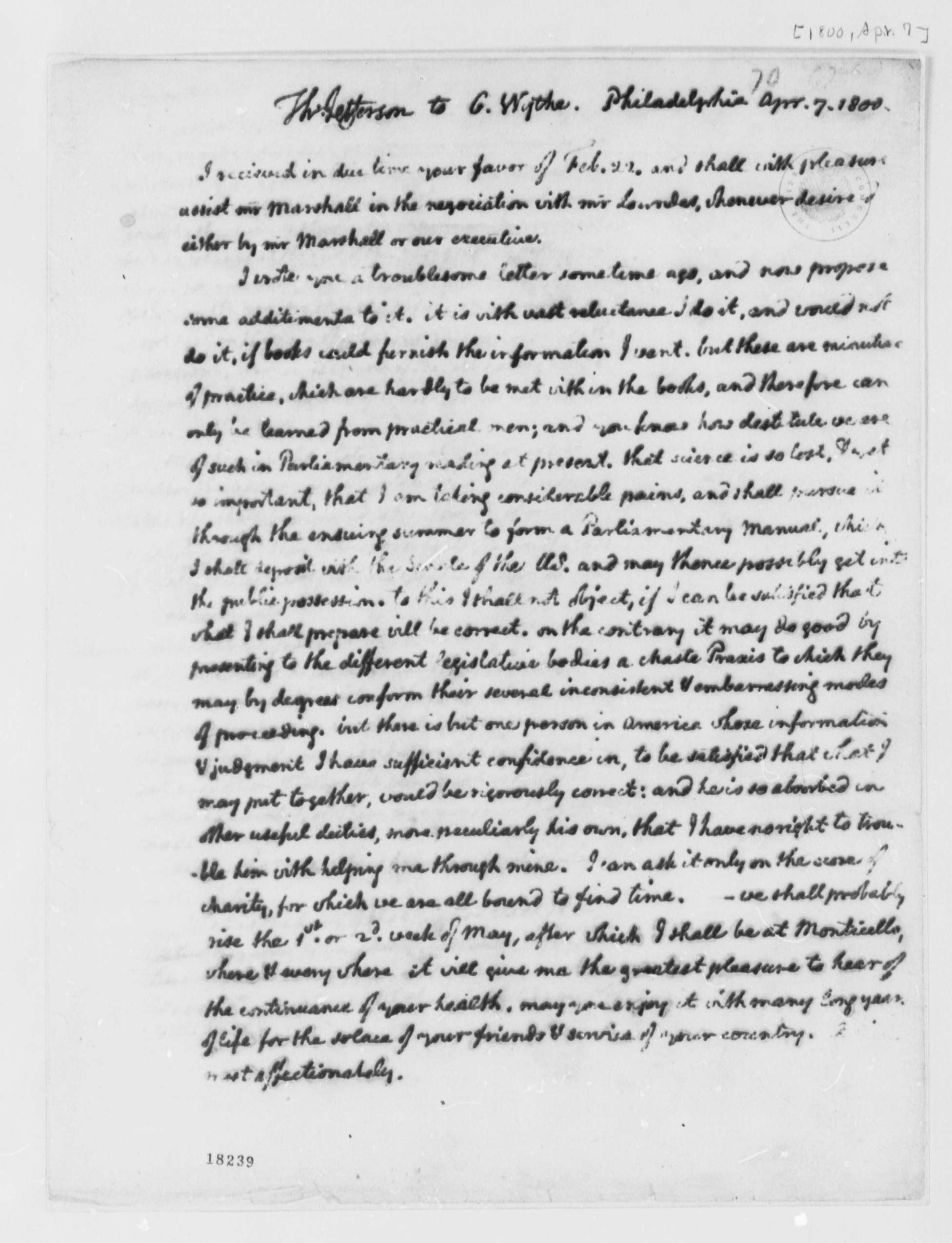
"Thomas Jefferson to Wythe, 7 April 1800, pg 1." Image from the Library of Congress, The Thomas Jefferson Papers.
Contents
Letter text
Page 1
Philadelphia Apr. 7. 1800.
I received in due time your favor of Feb. 22. and shall with pleasure assist mr Marshall in the negotiation with mr Lowndes, whenever desired either by mr Marshall or our executive.
I wrote you a troublesome letter sometime ago, and now propose some additiments to it. it is with vast reluctance I do it, and would not do it, if books could furnish the information I want. but these are minutiae of practice, which are hardly to be met with in the books, and therefore can only be learned from practical men; and you know how destitute we are of such in Parliamentary reading at present. that science is so lost, & yet so important, that I am taking considerable pains, and shall pursue it through the ensuing summer to form a Parliamentary Manual, which I shall deposit with the Senate of the US. and may thence possibly get into the public possession. to this I shall not object, if I can be satisfied that what I shall prepare will be correct. on the contrary it may do good by presenting to the different legislative bodies a chaste Praxis to which they may by degrees conform their several inconsistent & embarrassing modes of proceeding. But there is but one person in America whose information & judgment I have sufficient confidence in, to be satisfied that what I may put together, would be rigorously correct: and he is so absorbed in other useful duties, more peculiarly his own, that I have no right to trouble him with helping me through mine. I can ask it only on the score of charity, for which we are all bound to find time. we shall probably rise the 1st. or 2d. week of May, after which I shall be at Monticello, where & everywhere it will give me the greatest pleasure to hear of the continuance of your health. may you enjoy it with many long years of life for the solace of your friends & service of your country. Adieu most affectionately.
Page 2
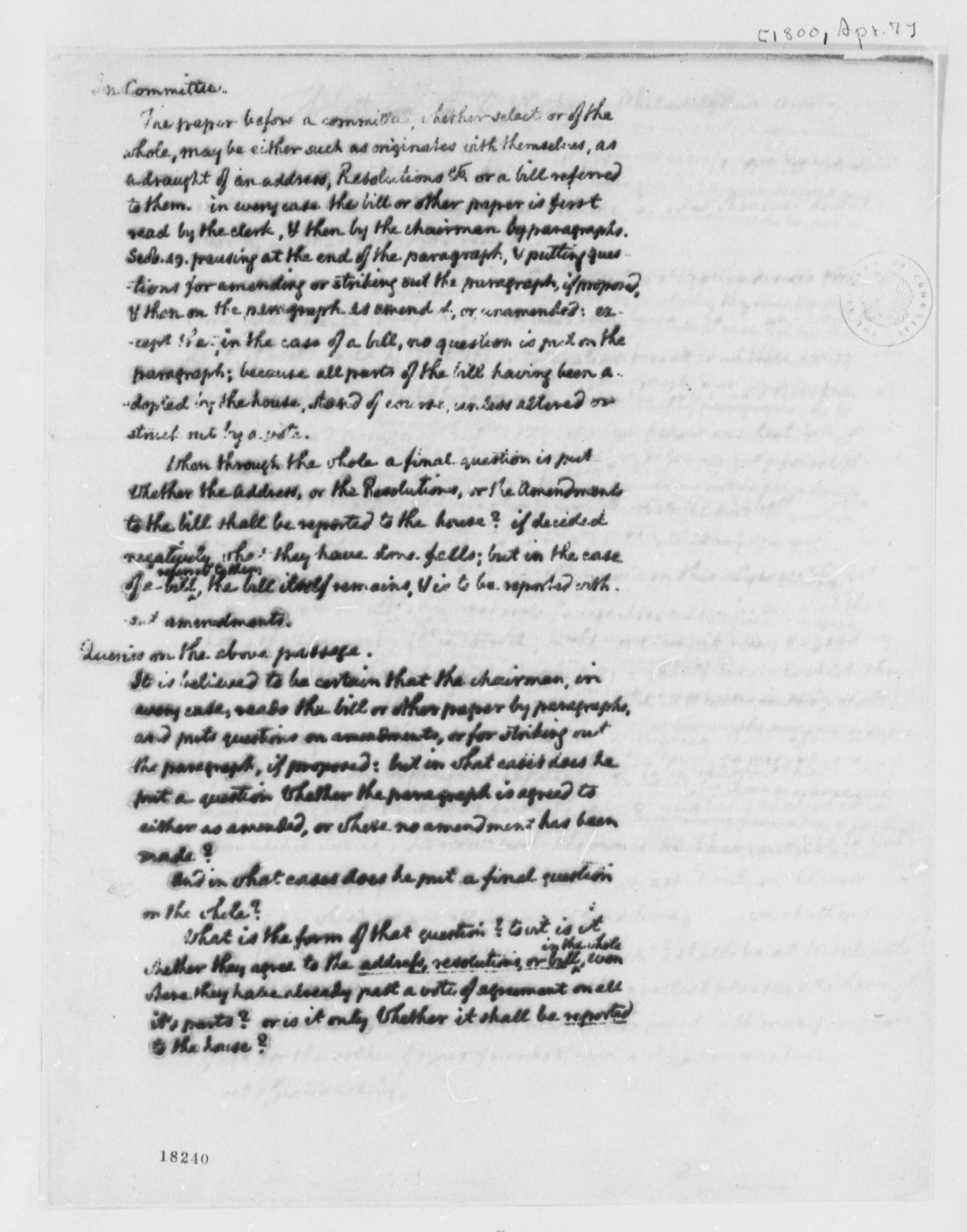
"Thomas Jefferson to Wythe, 7 April 1800, pg 2." Image from the Library of Congress, The Thomas Jefferson Papers.
In Committee.
The paper before a committee, whether select or of the whole, may be either such as originates with themselves, as a draught of an address, Resolutions or a bill referred to them. in every case the bill or other paper is first read by the clerk, & then by the chairmen by paragraphs. Scob. 49. pausing at the end of the paragraph, & putting questions for amending or striking out the paragraph, if proposed, & then on the paragraph as amended, or unamended: except that in the case of a bill, no question is put on the paragraph; because all parts of the bill having been adopted by the house, stand of course, unless altered or struck out by a vote.
When through the whole a final question is put whether the Address, or the Resolutions, or the Amendments to the bill shall be reported to the house? if decided negatively, what they have done falls; but in the case of a bill referred to them, the bill itself remains, & is to be reported without amendments.
Queries on the above passage.
It is believed to be certain that the chairman, in every case, reads the bill or other paper by paragraphs, and puts questions on amendments, or for striking out the paragraph, if proposed: but in what cases does he put a question whether the paragraph is agreed to either as amended, or where no amendment has been made?
And in what cases does he put a final question on the whole?
What is the form of that question? to wit is it whether they agree to the address, resolutions, or bill in the whole, even where they have already past a vote of agreement on all it's parts? or is it only whether it shall be reported to the house?
Page 3
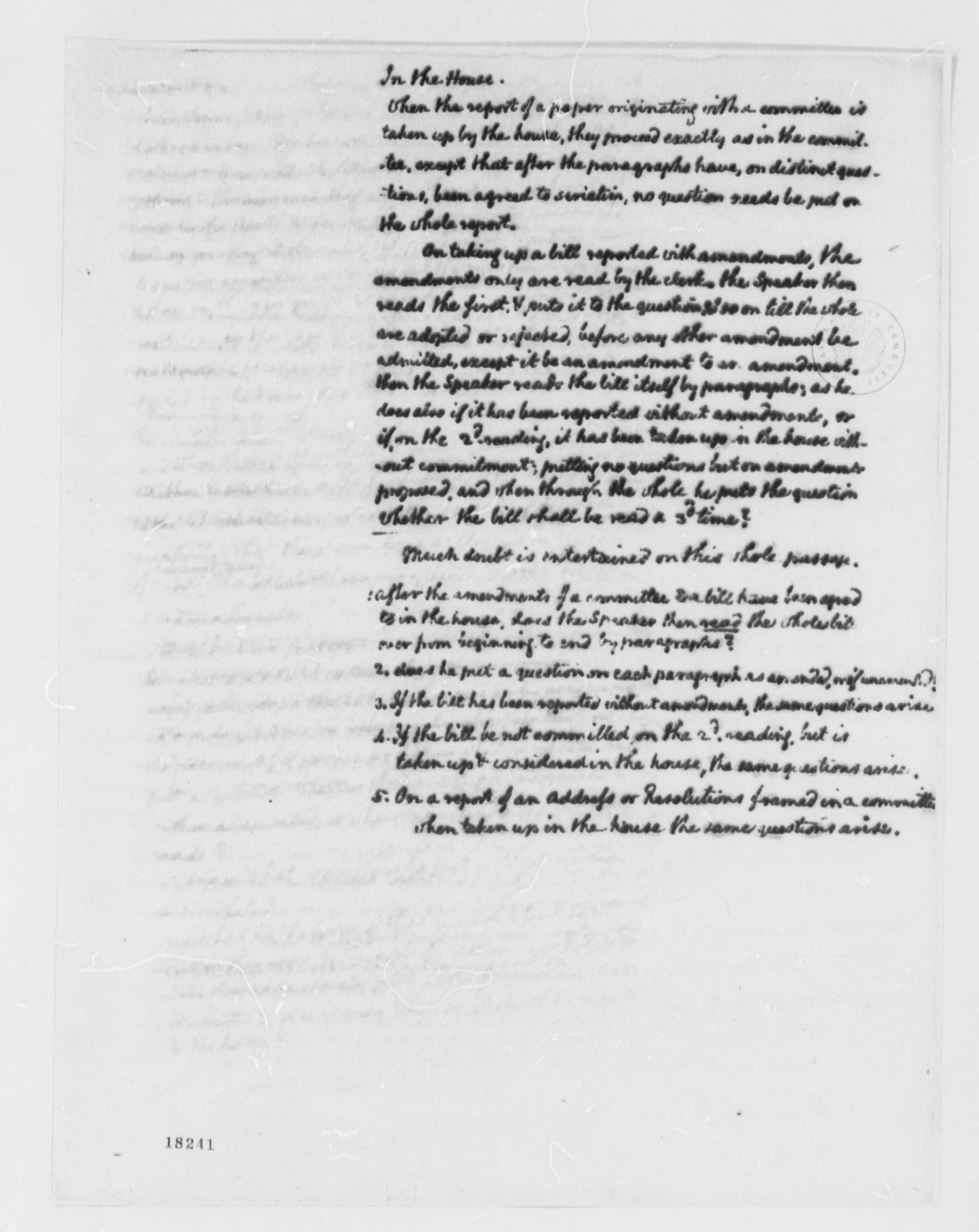
"Thomas Jefferson to Wythe, 7 April 1800, pg 3." Image from the Library of Congress, The Thomas Jefferson Papers.
In the House.
When the report of a paper originating with a committee is taken up by the house, they proceed exactly as in the committee, except that after the paragraphs have, on distinct questions, been agreed to seriatim, no question needs be put on the whole report.
On taking up a bill reported with amendments, the amendments only are read by the clerk. the Speaker then reads the first, & puts it to the question & so on till the whole are adopted or rejected, before any other amendment be admitted, except it be an amendment to an amendment. then the Speaker reads the bill itself by paragraphs; as he does also if it has been reported without amendments, or if, on the 2d. reading, it has been taken up in the house without commitment; putting no questions but on amendments proposed. and when through the whole he puts the question whether the bill shall be read a 3d. time?
Much doubt is entertained on this whole passage.
1. After the amendments of a committee to a bill have been agreed to in the house, does the Speaker then read the whole bill over from beginning to end by paragraphs?
2. does he put a question on each paragraph as amended, or if unamended?
3. If the bill has been reported without amendments, the same questions arise.
4. If the bill be not committed on the 2d. reading, but is taken up & considered in the house, the same questions arise.
5. On a report of an Address or Resolutions framed in a committee when taken up in the house the same questions arise.
Page 4
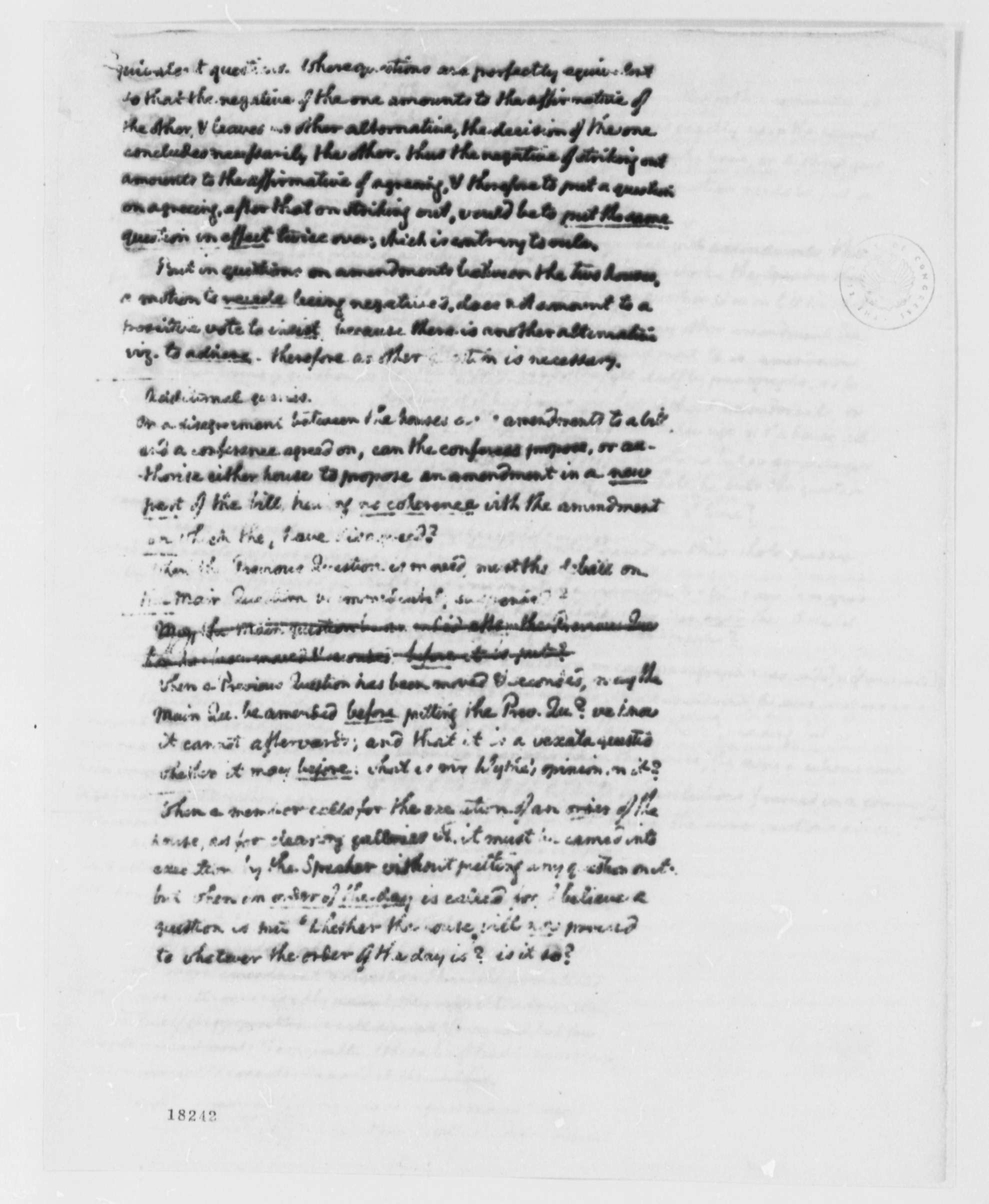
"Thomas Jefferson to Wythe, 7 April 1800, pg 4." Image from the Library of Congress, The Thomas Jefferson Papers.
Equivalent questions. Where questions are perfectly equivalent so that the negative of the one amounts to the affirmative of the other, & leaves no other alternative, the decision of the one concludes necessarily the other. thus the negative of striking out amounts to the affirmative of agreeing, & therefore to put a question on agreeing, after that on striking out, would be to put the same question in effect twice over; which is contrary to rule.
But in questions on amendments between the two houses, a motion to recede being negatived, does not amount to a positive vote to insist, because there is another alternative viz. to adhere. therefore another question is necessary.
Additional queries.
On a disagreement between the houses on amendments to a bill and a conference agreed on, can the conference propose, or authorize either house to propose an amendment in a new part of the bill, having no coherence with the amendment on which they have disagreed?
When a Previous Question has been moved & seconded, may the Main Qu. be amended before putting the Prev. Qu? we know it cannot afterwards; and that it is a vexata questio whether it may before: what is mr Wythe’s opinion on it?
When a member calls for the execution of an order of the house, as for clearing galleries &c. it must be carried into execution by the Speaker without putting any question on it. but when an order of the day is called for, I believe a question is but 'Whether the house will now proceed to whatever the order of the day is? is it so?
Page 5
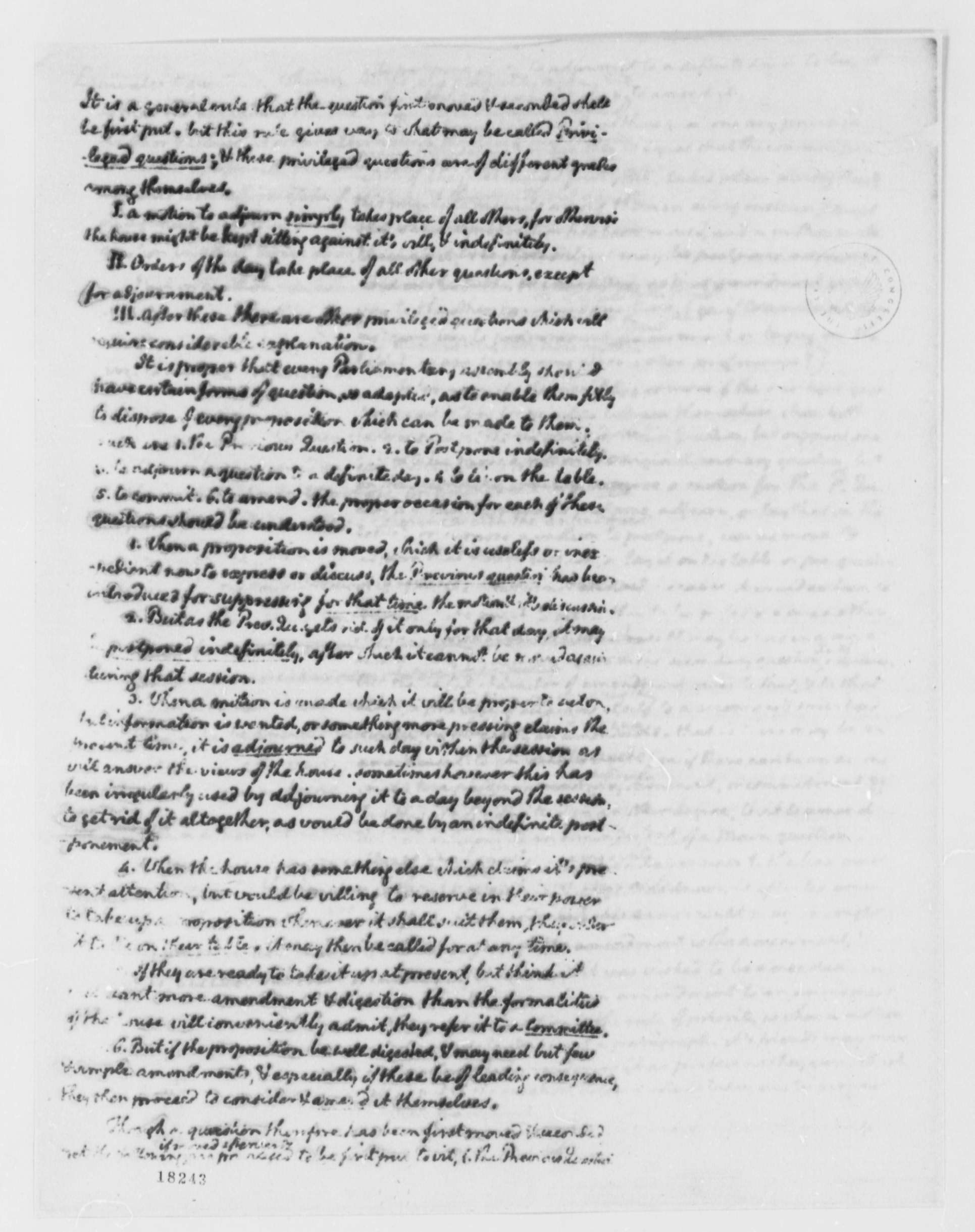
"Thomas Jefferson to Wythe, 7 April 1800, pg 5." Image from the Library of Congress, The Thomas Jefferson Papers.
It is a general rule that the question first moves & seconded shall be first put. But this rule gives way to what may be called Privileged questions; & these privileged questions are of different grades among themselves.
I. A motion to adjourn simply takes place of all others, for otherwise the house might be kept sitting against it’s will, & indefinitely.
II. Orders of the day take place of all other questions, except for adjournment.III. After these there are other privileged questions which all require considerable explanation.
It is proper that every Parliamentary assembly should have certain forms of question, [is?] adopted, as to enable them fitlyto dispose of every proposition which can be made to them. […] 1. the Previous Question. 2. To Postpone indefinitely. 3. To […?] a question to a definite day. 4. […] on the table. 5. To commit. 6. To amend. The proper occasion for each of these questions should be understood.
1. Then a proposition is moved, which it is useless or inexpedient now to [eagness?] or discuss, the Previous question has been introduced for suppressing for that [tione?] . The motion, it’s discussion.
2. But as the Prev. Qu. gets rid. of it only for that day, it may be postponed indefinitely, after which it cannot be read again during that session.
3. When a motion is made which it will be proper to act on, but information is wanted, or something more pressing claims the meant time, it is adjourned to such day within the session as will answer the views of the house. Sometimes, however, this has been irregularly used by adjourning it to a day beyond the session to get rid of it altogether, as would be done by an indefinite postponement.
4. When the house has something else which claims its immediate attention, but would be willing to reserve in their power to take up a proposition whenever it shall suit them, thereafter […]. It may then be called for at any time.
5. If they are ready to take it up at present, but think it […] more amendment & digestion than the formalities of the […] will conveniently admit, they refer it to a Committee.
6. But if the proposition be well digested, & may need but few & simple amendments, & especially if these be of leading consequence, they then proceed to consider & amend it themselves.
Though a question therefore has been first moved & amended, yet it […] to be first […?] to wit, 1. The Previous Question
Page 6
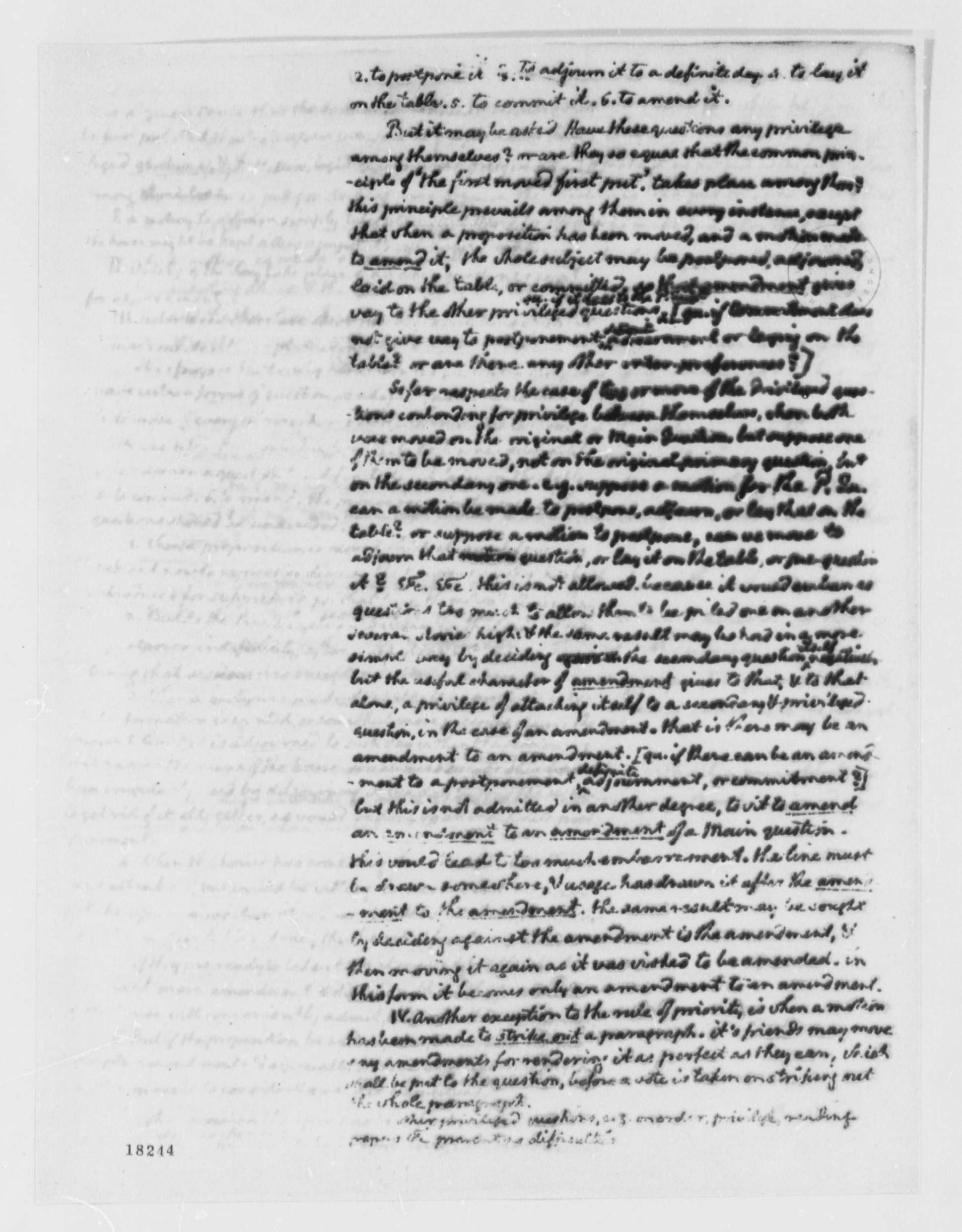
"Thomas Jefferson to Wythe, 7 April 1800, pg 6." Image from the Library of Congress, The Thomas Jefferson Papers.
2. to postpone it 3. to adjourn it to a definite day. 4. To lay it on the table. 5. To commit it. 6. To amend it.
But it may be asked: Have these questions any privilege among themselves? Or are they so equal that the common principle of ‘the first moved first put.’ Takes place among them? This principle prevails among them in every instance, except that when a proposition has been moved, and a motion […] to amend it, the whole subject may be postponed, adjourned, laid on the table, or committed, to that amendment gives way to the other privileged questions […] if it […] if commitment does not give way to postponement, despite adjournment or leaving on the table, or are there any other interpretations?
So far respects the case of two or more of the privileged questions contending for privileges between themselves, when both were moved on the original or Main Question, but suppose one of them to be moved, not on the original previous question, but on the secondary one. […] suppose a motion for the P. Qu. can a motion be made to postpone, adjourn, or lay that on the table? Or suppose a motion to postpone, can we move to adjourn that motion question, or lay it on the table, or […] it? Etc. etc. this is not allowed. Because it would […] as questions too much to allow them to be piled one on another several stones high: & the same result may be had in a more simple way by deciding the secondary question itself negatively, but the useful character of amendment gives to that, & to that alone, a privilege of attaching itself to a secondary & privileged question, in the case of an amendment. That is there may be an amendment to an amendment. [qu. if there can be an amendment to a postponement, definite adjournment, or commitment?] but this is not admitted in another degree, to wit to amend an amendment to own amendment of a Main question. This would lead to too much endorsement. The line must be drawn somewhere, & usage has drawn it after the amendment to the amendment. The same result may be sought by deciding against the amendment to the amendment, & then moving it again as it was wished to be amended. In this form it becomes only an amendment to an amendment.
14. Another exception to the rule of priority is when a motion has been made to strike out a paragraph. It’s friends may move many amendments for rendering it as perfect as they can, which shall be put to the question, before a vote is taken on striking out the whole paragraph.
Other privileged questions, viz. on ordering privilege, reading papers the […] difficulties.
Page 7
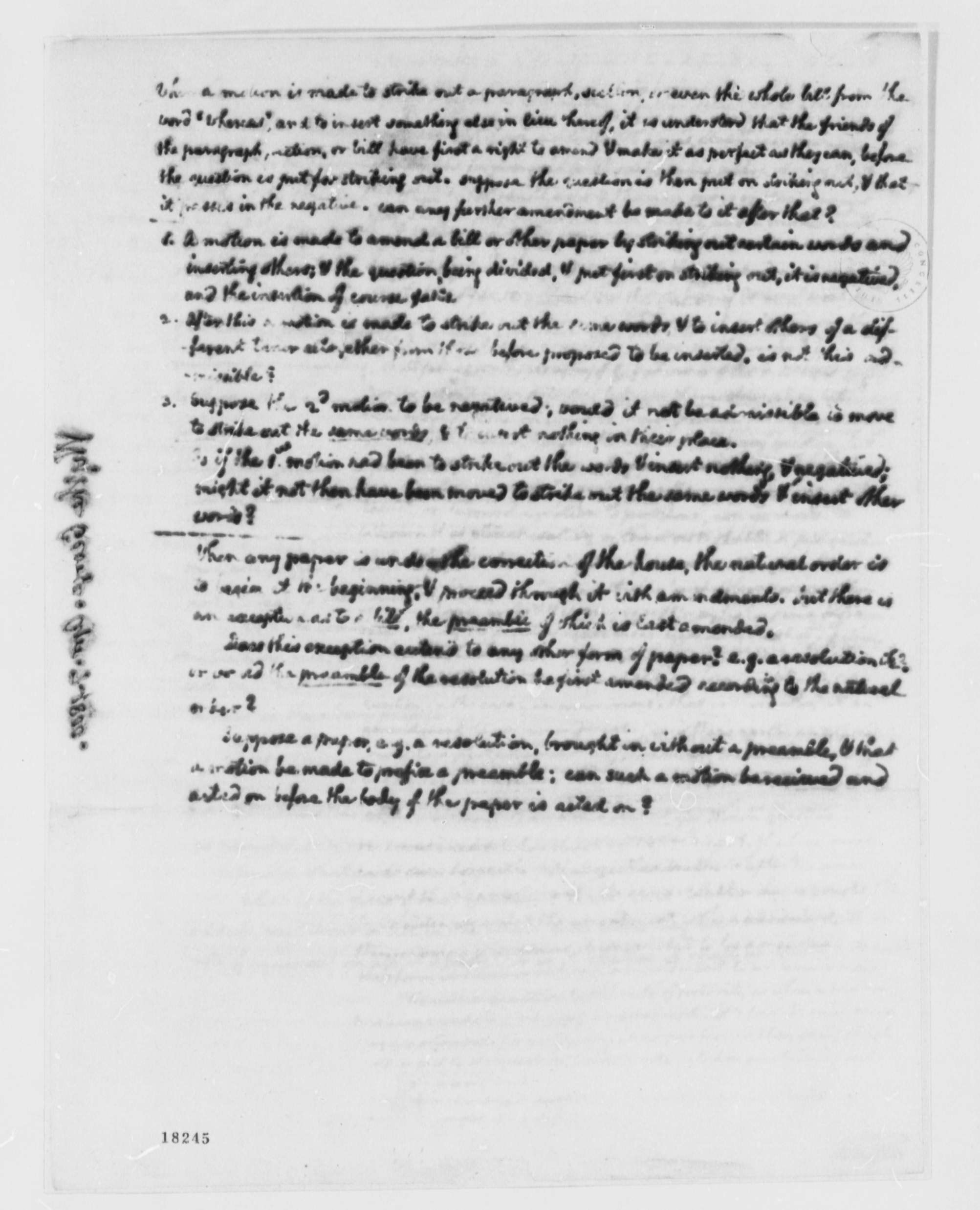
"Thomas Jefferson to Wythe, 7 April 1800, pg 7." Image from the Library of Congress, The Thomas Jefferson Papers.
When a motion is made to strike out a paragraph, section, or even the whole bill from the word ‘whereas’ and to insert something else in lieu thereof, it is understood that the friends of the paragraph, section, or bill have first a right to amend & make it as perfect as they can, before the question is put for striking out. suppose the question is then put on striking out, & that it passes in the negative. can any further amendment be made to it after that?
1. A motion is made to amend a bill or other paper by striking out certain words and inserting others; & the question, being divided, & put first on striking out, it is negatived, and the insertion of course falls.
2. After this, a motion is made to strike out the same words & to insert others of a different tenor altogether from those before proposed to be inserted, is not this admissible?
3. Suppose the 2d. motion to be negatived; would it not be admissible to move to strike out the same words, & to insert nothing in their place.
So if the 1st. motion had been to strike out the words & insert nothing, & negatived; might it not then have been moved to strike out the same words & insert other words?
When any paper is under the correction of the house, the natural order is to begin at the beginning, & proceed through it with amendments. but there is an exception as to a bill, the preamble of which is last amended.
Does this exception extend to any other form of paper? e.g. a resolution &c. or would the preamble of the resolution be first amended according to the natural order?
Suppose a proper, e.g. a resolution, brought in without a preamble, & that a motion be made to prefix a preamble; can such a motion be received and acted on before the body of the paper is acted on?
Page 8
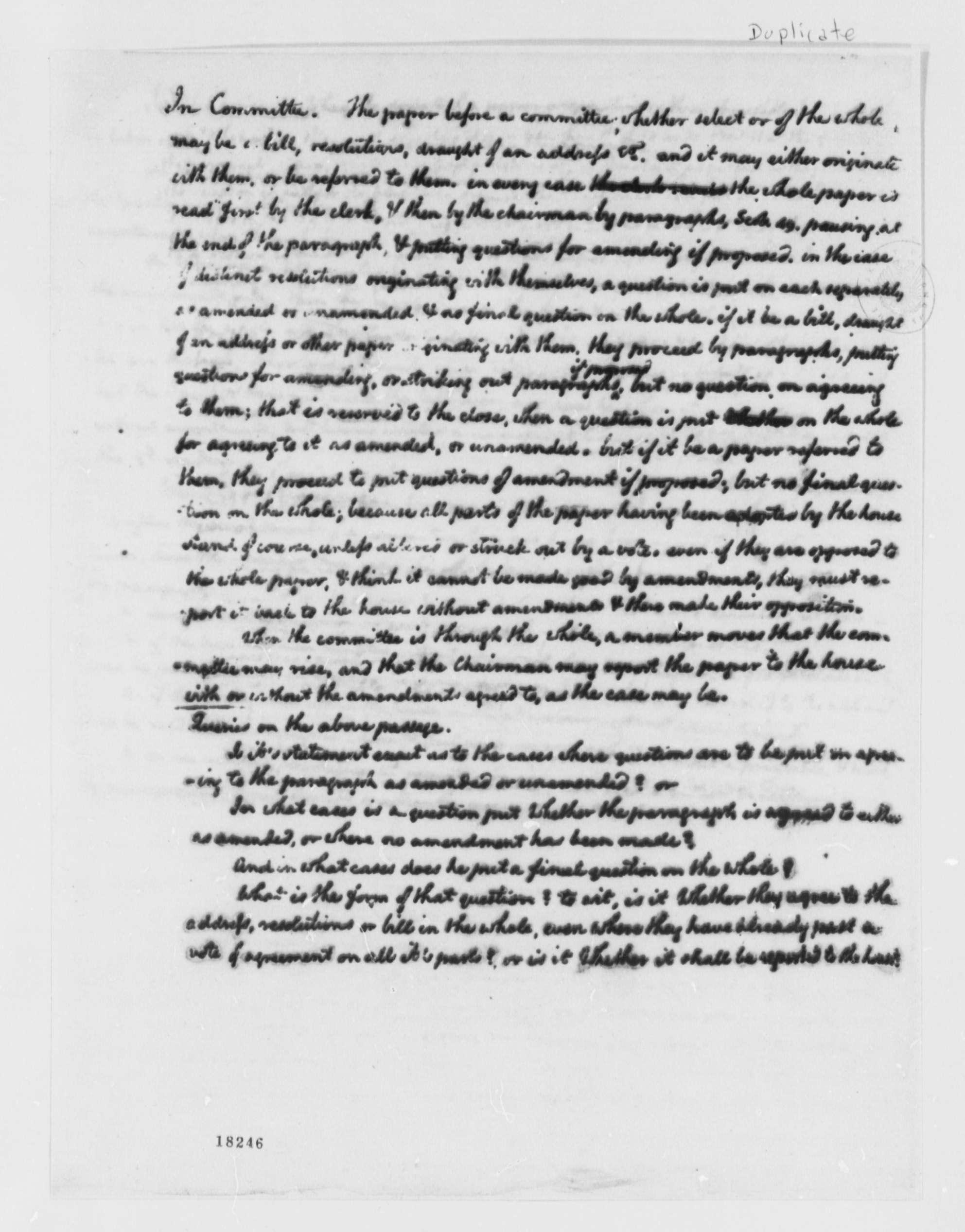
"Thomas Jefferson to Wythe, 7 April 1800, pg 8." Image from the Library of Congress, The Thomas Jefferson Papers.
In Committee. The paper before a committee, whether select or of the whole, may be a bill, resolutions, draught of an address &c. and it may either originate with them, or be referred to them. in every case the whole paper is read first by the clerk, & then by the chairman by paragraphs, Scob. 49. pausing at the end of the paragraph, & putting questions for amending if proposed. in the case of distinct resolutions originating with themselves, a question is put on each separately as amended or unamended & no final question on the whole. if it be a bill, draught of an address or other paper originating with them, they proceed by paragraphs, putting questions for amending, or striking out paragraphs if proposed, but no question on agreeing to them; that is reserved to the close, when a question is put on the whole for agreeing to it as amended, or unamended. but if it be a paper referred to them, they proceed to put questions of amendment if proposed; but no final question on the whole; because all parts of the paper having been adopted by the house stand of course, unless altered or struck out by a vote. even if they are opposed to the whole paper, & think it cannot be made good by amendments, they must report it back to the house without amendments & there make their opposition.
When the committee is through the whole, a member moves that the committee may rise, and that the Chairman may report the paper to the house with or without the amendments agreed to, as the case may be.
Queries on the above passage.
Is it’s statement exact as to the cases where questions are to be put on agreeing to the paragraph as amended or unamended? or
In what cases is a question put whether the paragraph is agreed to either as amended, or where no amendment has been made?
And in what cases does he put a final question on the whole?
What is the form of that question? to wit, is it Whether they agree to the address, resolutions or bill in the whole, even where they have already past a vote of agreement on all it’s parts? or is it Whether it shall be reported to the house?
Page 9
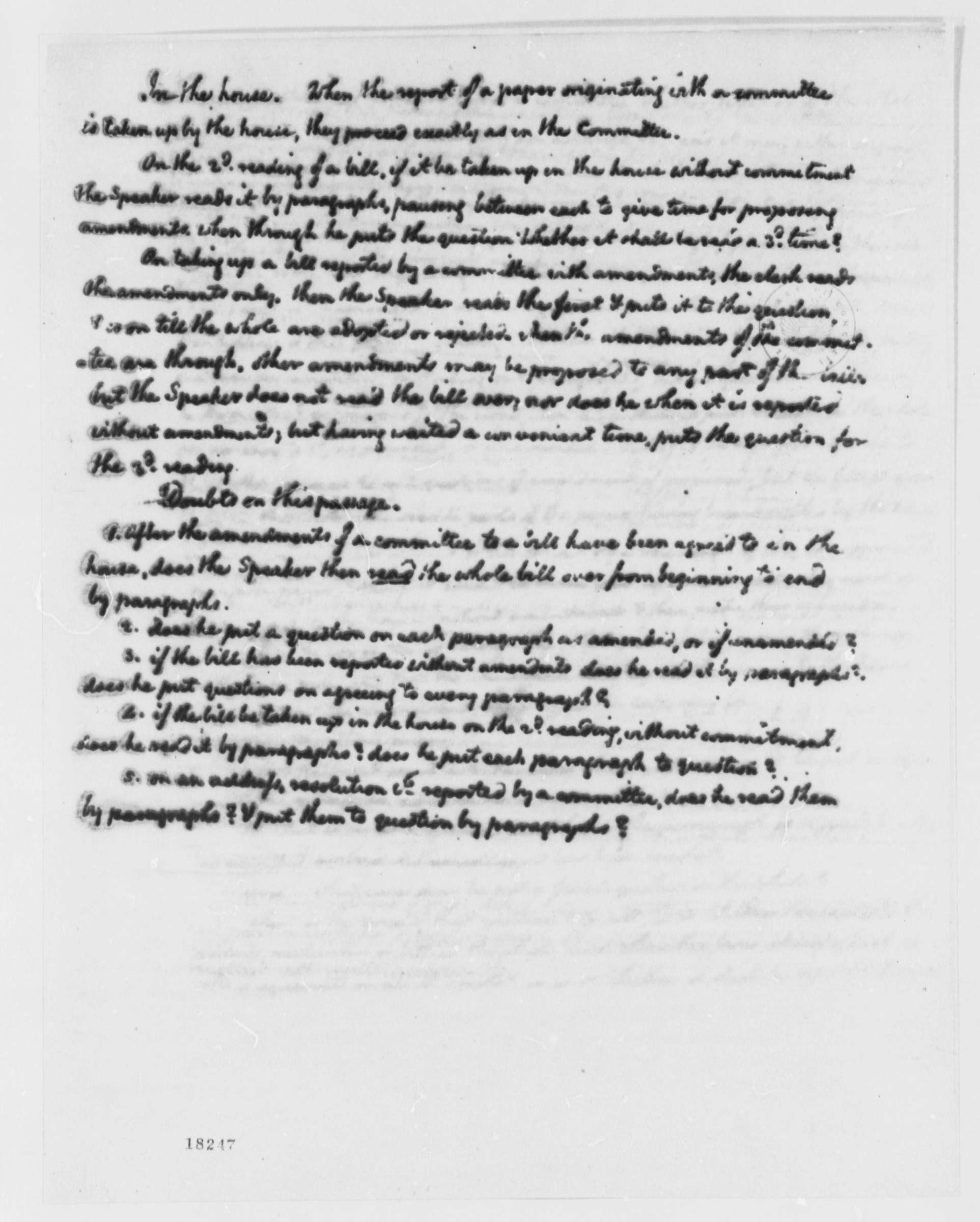
"Thomas Jefferson to Wythe, 7 April 1800, pg 9." Image from the Library of Congress, The Thomas Jefferson Papers.
In the house. When the report of a paper originating with a committee is taken up by the house, they proceed exactly as in the Committee.
On the 2d. reading of a bill, if it be taken up in the house without commitment the Speaker reads it by paragraphs, pausing between each to give time for proposing amendments. when through he puts the question Whether it shall be read a 3d. time?
On taking up a bill reported by a committee with amendments, the clerk reads the amendments only. then the Speaker reads the first & puts it to this question & so on till the whole are adopted or rejected. when the amendments of the committee are through, other amendments may be proposed to any part of the bill; but the Speaker does not read the bill over; nor does he when it is reported without amendments; but having waited a convenient time, puts the question for the 3d. reading.
Doubts on this passage.
1. After the amendments of a committee to a bill have been agreed to in the house, does the Speaker then read the whole bill over from beginning to end by paragraphs.
2. does he put a question on each paragraph as amended, or if unamended?
3. if the bill has been reported without amendments does he read it by paragraphs? does he put questions on agreeing to every paragraph?
4. if the bill be taken up in the house on the 2d. reading, without commitment, does he read it by paragraphs? does he put each paragraph to question?
5. on an address, resolution &c. reported by a committee, does he read them by paragraphs? & put them to question by paragraphs?
Page 10
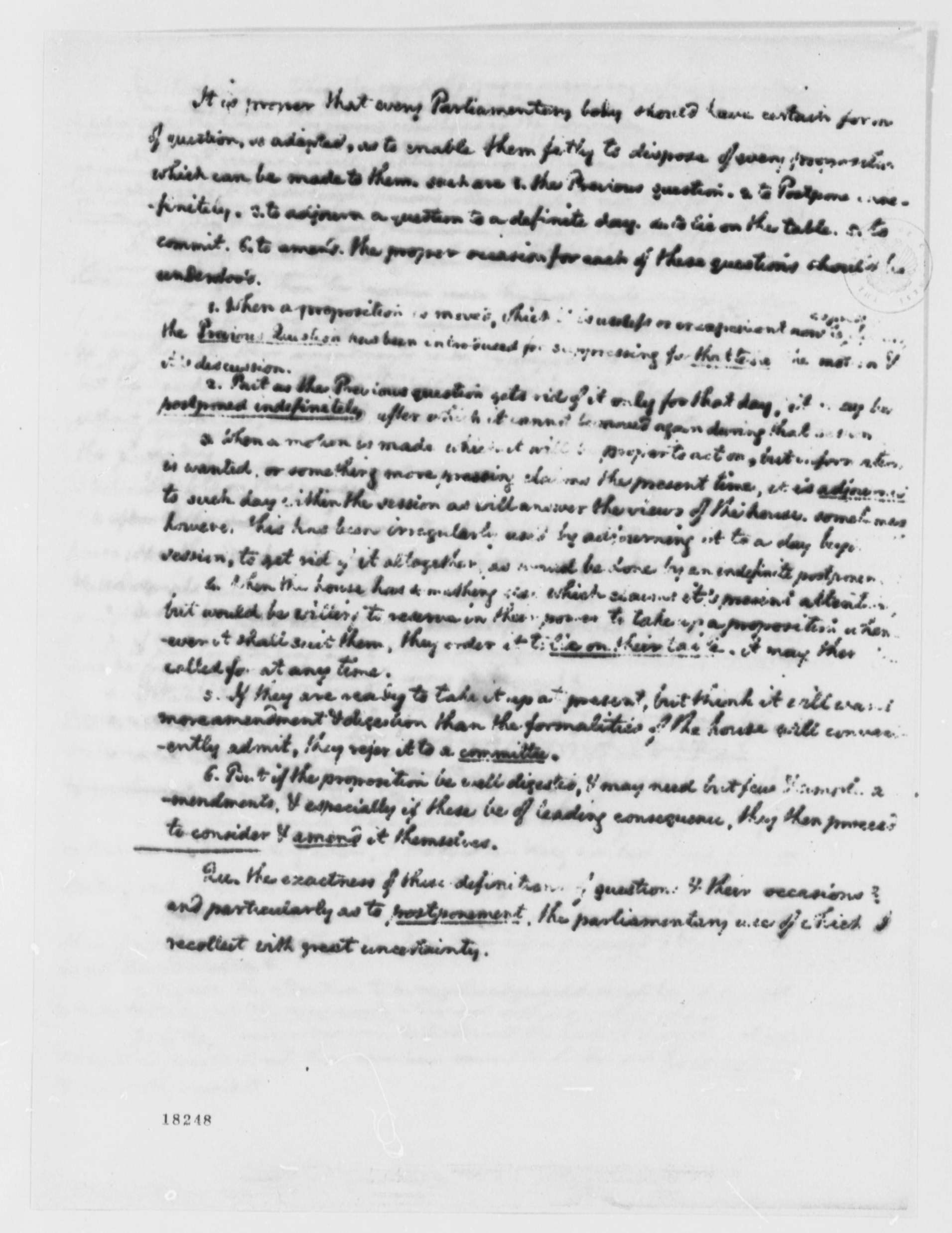
"Thomas Jefferson to Wythe, 7 April 1800, pg 10." Image from the Library of Congress, The Thomas Jefferson Papers.
It is proper that every Parliamentary body should have certain form of question, as adopted, is to enable them fitly to dispose of every proposition which can be made to them. such are 1. the Previous question. 2. to Postpone indefinitely. 3. to adjourn a question to a definite day. 4. to lie on the table. 5. to commit. 6. to amend. the proper occasion for each of these questions should be understood.
1. When a proposition is moved, which it is useless or inexpedient now to express or discuss, the Previous Question has been introduced for suppressing for that time the motion & it’s discussion.
2. Put as the Previous question gets rid of it only for that day, it may be postponed indefinitely after which it cannot be moved again during that session.
3. When a motion is made which it will be proper to act on, but information is wanted, or something more pressing claims the present time, it is adjourned to such day within the session as will answer the views of the houses. Sometimes however, this has been irregularly used by adjourning it to a day beyond the session, to get rid of it altogether, as would be done by an indefinite postponement
4. When this house has something else which was not it’s present attention but would be written to reserve in their power to take up a proposition whenever it shall suit them, they order it to lie on their table. it may then be called for at any time.
5. If they are ready to take it up at present, but think it will warrant more amendment & digestion than the formalities of the house will conveniently admit, they refer it to a committee.
6. But if the proposition be well digested, & may need but few and simple amendments, & especially if these be of leading consequence, they then proceed to consider & amend it themselves.
Qu. the exactness of these definitions of questions & their occasions? and particularly as to postponement, the parliamentary uses of which I recollect with great uncertainty.
Page 11
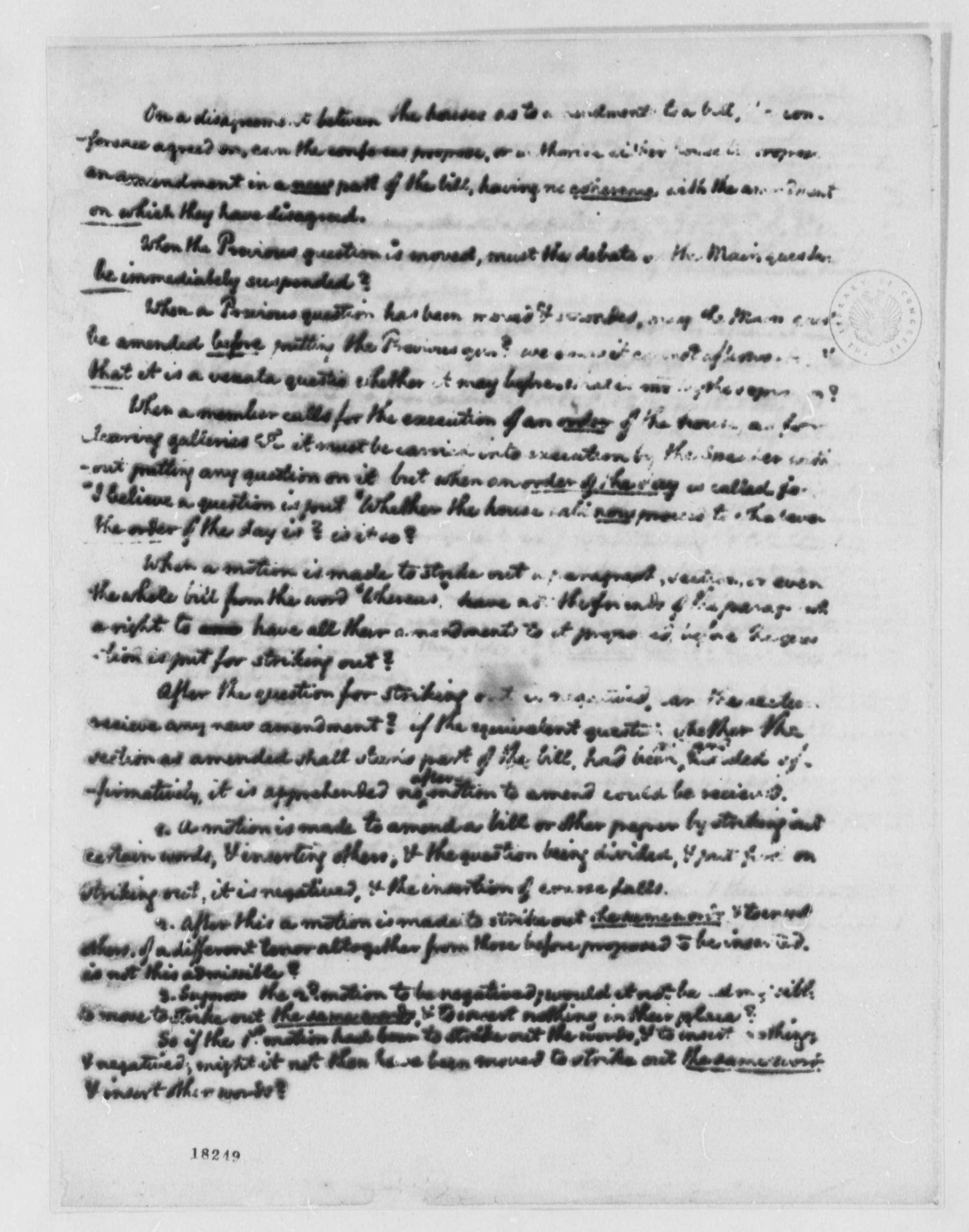
"Thomas Jefferson to Wythe, 7 April 1800, pg 11." Image from the Library of Congress, The Thomas Jefferson Papers.
On a disagreement between the houses as to amendment to a bill, and a conference agreed on, can the conferees propose, or authorise either house to propose an amendment in a new part of the bill, having no coherence with the amendment on which they have disagreed.
When the Previous question is moved, must the debate on the Main question be immediately suspended?
When a Previous question has been moved & seconded, may the Main question be amended before putting the Previous qu.? We know it cannot afterwards; and that it is a vexata questio whether it may before. what is mr Wythe’s opinion?
When a member calls for the execution of an order of the house, as for clearing galleries &c. it must be carried into execution by the Speaker without putting any question on it but when an order of the day is called, for I believe a question is put ‘Whether the house call now proceed to whatever the order of the day is? is it so?
When a motion is made to strike out a paragraph, section, or even the whole bill from the word ‘whereas’ have as the friends of the paragraph a right to have all their amendments to it proposed before the question is put for striking out?
After the question for striking out is negatived, can the section receive any new amendment? if the equivalent question whether the section as amended shall stands part of the bill, had been put and decided affirmatively, it is apprehended no after-motion to amend could be received.
1. A motion is made to amend a bill or other paper by striking out certain words, & inserting others, & the question being divided, & put for on striking out, it is negatived, & the insertion of course falls.
2. After this a motion is made to strike out the amendments & to amend others of a different tenor altogether from those before proposed to be inserted. is not this admissible?
3. Suppose the 2d motion to be negatived; would it not be admissible to move to strike out the same words & to insert nothing in their place?
So if the 1st motion had been to strike out the words, & to insert nothing & negatived, might it not then have been moved to strike out the same word. & insert other words?
Page 12
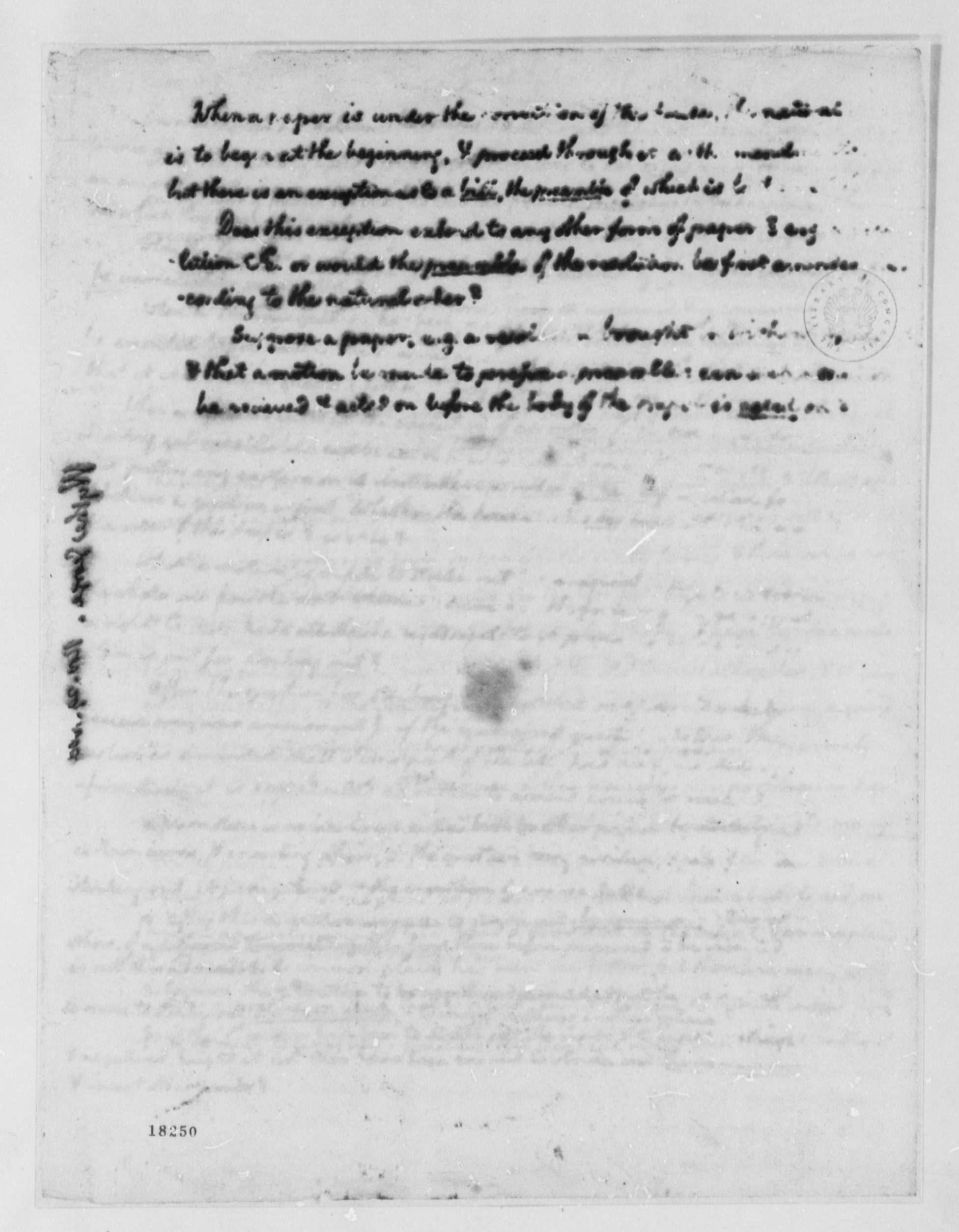
"Thomas Jefferson to Wythe, 7 April 1800, pg 12." Image from the Library of Congress, The Thomas Jefferson Papers.
When a paper is under the correction of the house, the natural order is to begin at the beginning, & proceed through it with amendments. but there is an exception as to a bill, the preamble of which is last amended.
Does this exception extend to any other form of paper? e.g. a resolution &c. or would the preamble of the resolution be first amended, according to the natural order?
Suppose a paper, e.g. a resolution, brought in without a preamble & that a motion be made to prefix a preamble; can such a motion be received and acted on before the body of the paper is acted on?